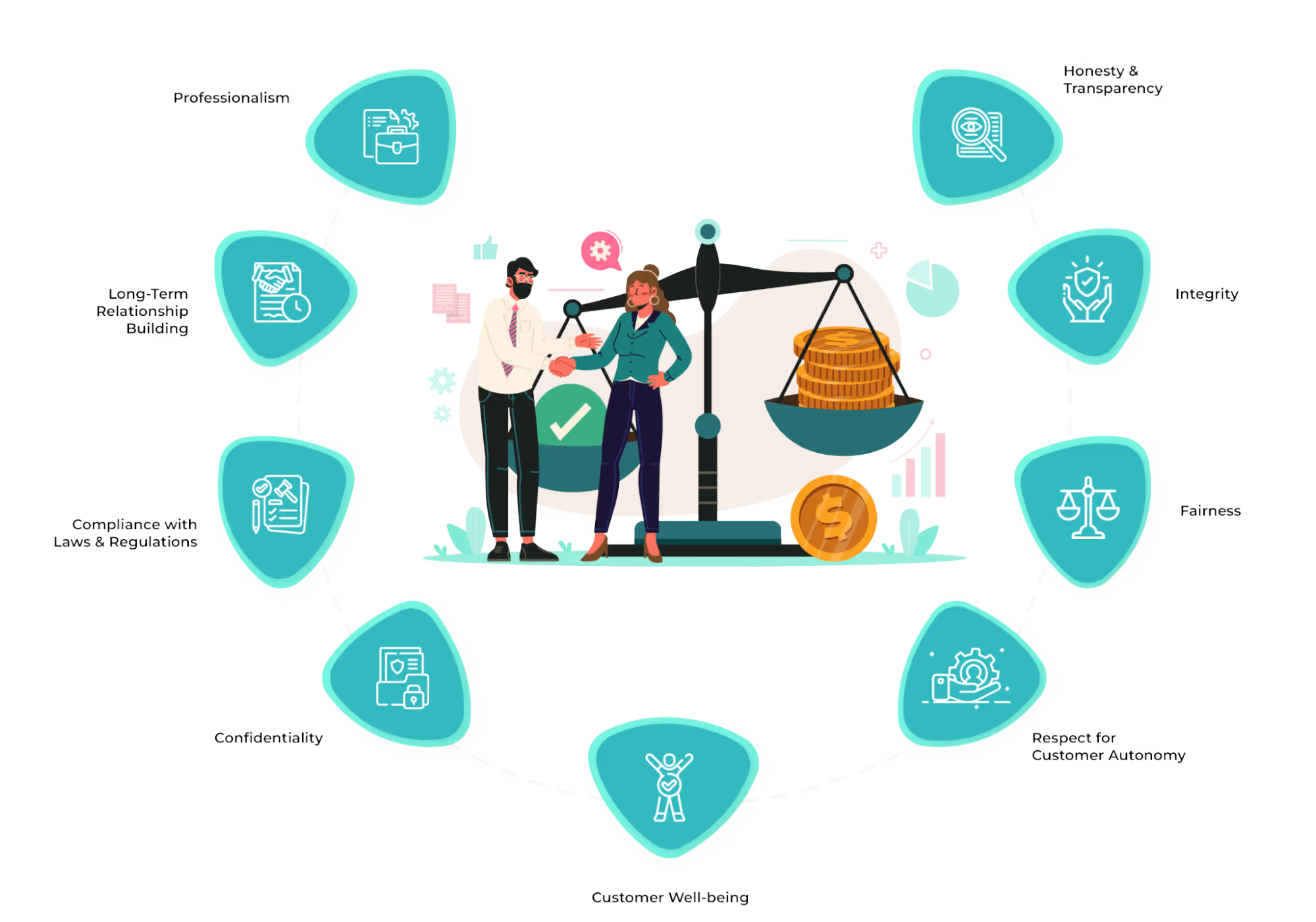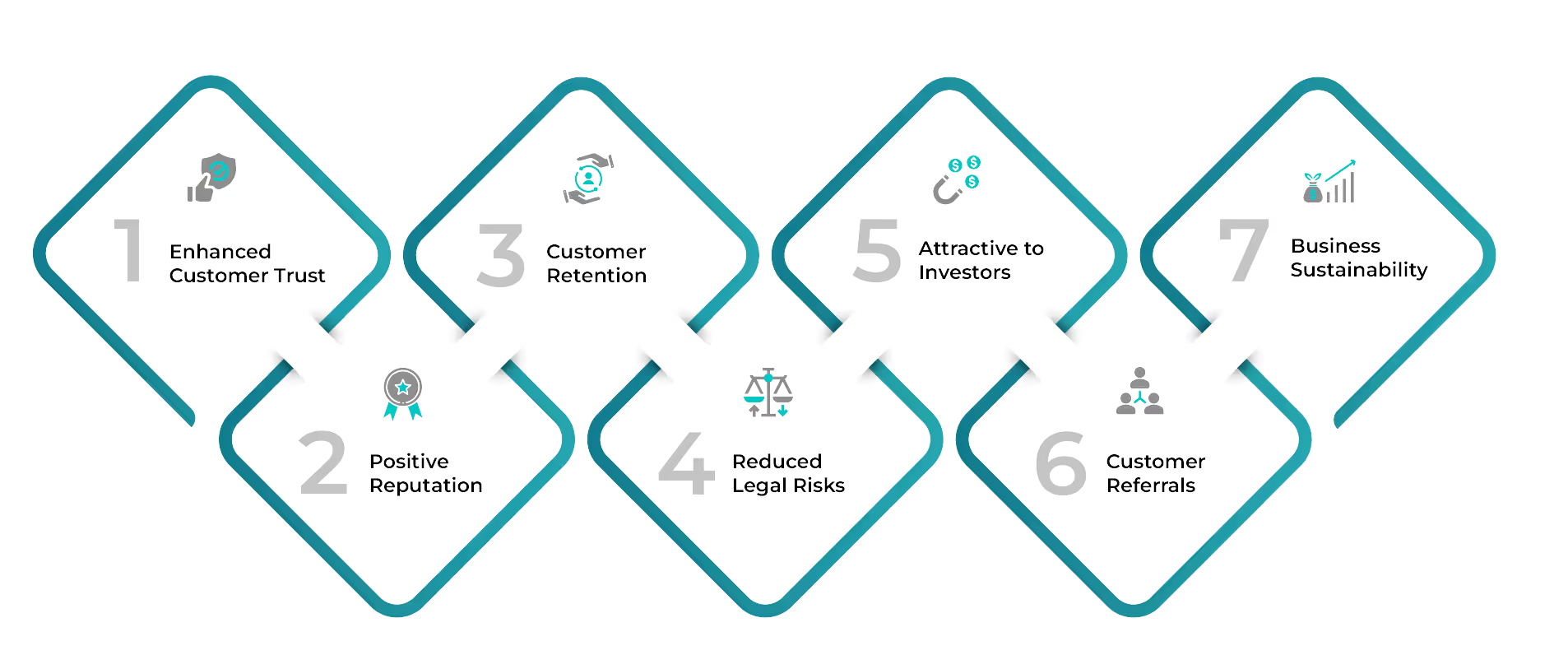
Blog
What are the Benefits of Implementing Sales Ethics in your Business?
January 25, 2024


Key Insights
Sales is competitive and many are on the run to fulfill their goals and targets. However, success in sales is also dependent on the long-lasting relations you build with your customers.
Hence, sales professionals must be tactful in ensuring faster conversion rates without making the client feel pushy about the deal! To imbibe such skills your sales force must be trained on the ethical approach expected towards your customers.
In this article, we will discuss how following ethical sales practices will positively impact your marketing. We will explore understanding what sales ethics are, what sales ethics are expected of your salesforce, the benefits of implementing sales ethics in your business, and how sales ethics help in customer satisfaction.
What is sales ethics?
Sales ethics establishes the principles and guidelines guiding the conduct of individuals in sales and marketing, emphasizing fair practices even in challenging scenarios, such as those faced by commission-only sales reps. It involves making ethical decisions and adhering to moral standards throughout the sales process.
Sales ethics encompasses a set of values that prioritize honesty, integrity, transparency, and fair treatment of customers. Incorporating these ethical principles into sales practices empowers businesses to establish trust with customers, enhance their reputation, and contribute to the overall integrity of the sales profession.
Ethical sales practices not only benefit customers but also lead to sustainable business growth and positive brand perception.
What is ethical behavior for a sales professional?
Ethics in sales is integral to a sales professional as it opens a wide opportunity and enhances their approachability towards clients.
So let's look at some of the ethical practices that are a must-have in all sales professionals.

Honesty and Transparency
In addition, incorporating rigorous sales force performance evaluation mechanisms ensures that sales professionals adhere to ethical standards by providing accurate and truthful information to customers, including transparent discussions about product drawbacks or limitations.
Integrity
Sales reps must uphold a high standard of moral and ethical principles in all interactions with customers, colleagues, and stakeholders.
Fairness
Sales professionals must treat all customers equally without discrimination and ensure that pricing and terms are fair and reasonable.
Respect for Customer Autonomy
Integrating an ethical sales approach involves respecting the autonomy of customers, refraining from manipulative tactics, and fostering an environment where individuals can make informed decisions based on their needs and preferences.
Customer Well-being
Sales reps must prioritize the well-being and satisfaction of customers over short-term gains and avoid practices that may bring harm or loss to them.
Confidentiality
Sales representatives, in contrast to sales associates, must uphold the highest standards of safeguarding customer information and respecting their privacy by not disclosing sensitive data without proper consent as a top priority.

Compliance with Laws and Regulations
Sales reps must always adhere to legal and regulatory requirements governing sales and marketing activities.
Long-Term Relationship Building
Sales professionals must focus on building long-lasting relationships with customers rather than prioritizing quick, one-time transactions or closing deals.
Professionalism
Sales reps must professionally conduct themselves at all times. This includes being punctual, pleasant, approachable, and maintaining a positive and respectful attitude.
Customers judge sales professionals from the way they dress to how they carry themselves. Hence the importance of sales ethics also involves being presentable with a smiling and pleasant attitude so that customers feel drawn to you.
For further reading, check Crafting a Winning Compensation Strategy for Maximizing Success.
What are the benefits of implementing sales ethics in our business?
Implementing sales ethics in your business can yield various benefits that contribute to long-term success and positive brand perception.
Let's look at some of these key advantages of implementing sales ethics for business growth:

Enhanced Customer Trust
Ethical behavior builds trust with customers. When they perceive that your sales team operates with integrity, honesty, and transparency, they are more likely to trust your brand, make repeat purchases, and recommend your products or services to others.
Positive Reputation
A commitment to sales ethics enhances your business's reputation. Customers are more inclined to support and engage with companies that are known for ethical business practices. A positive reputation can lead to increased customer loyalty and a competitive advantage in the market.
Customer Retention
Ethical sales practices contribute to building long-lasting relationships with customers. When customers feel that they are treated fairly and with respect, they are more likely to remain loyal to your brand, reducing churn and the need for constant customer acquisition.
Reduced Legal Risks
Adhering to ethical standards ensures compliance with laws and regulations governing sales activities. This reduces the risk of legal issues, fines, or damage to your business's reputation due to non-compliance.
Attractive to Investors
Ethical business practices are increasingly important to investors and stakeholders. Companies that demonstrate a commitment to ethical conduct may be more attractive to socially responsible investors, contributing to financial stability and growth opportunities.
Customer Referrals
Satisfied customers are more likely to share their positive experiences with others. Ethical practices create a strong foundation for positive word-of-mouth marketing and customer referrals, leading to organic business growth.
Business Sustainability
Building a business on ethical principles fosters long-term sustainability. While unethical practices might yield short-term gains, they often lead to negative consequences in the long run. Ethical businesses are better positioned for enduring success.
Thus, sales ethics has a moral and positive impact on your business that fosters customer loyalty and contributes to the overall success and sustainability of your organization.
For further reading, check Sales Funnel vs Marketing Funnel: What’s the Difference
How does sales ethics help in customer satisfaction?
Sales ethics significantly contributes to customer satisfaction by fostering trust, transparency, and fair treatment. When sales professionals adhere to ethical principles, customers feel confident that they are dealing with an honest and reliable partner.
Clear communication and truthful representation of products or services create realistic expectations, reducing the likelihood of disappointment. Ethical practices prioritize customer needs over immediate gains, leading to solutions that genuinely address their requirements. Respect for customer autonomy ensures that purchasing decisions are made willingly, without undue pressure.
Satisfied customers are more likely to remain loyal, engage in repeat business, and become advocates for the brand, amplifying positive word-of-mouth. Ultimately, the establishment of ethical standards in sales forms the foundation for lasting customer relationships and overall satisfaction.
For sales-related reading, visit https://www.kennect.io/. For more information Book A Demo NOW!
ReKennect : Stay ahead of the curve!
Subscribe to our bi-weekly newsletter packed with latest trends and insights on incentives.
Thank you! Your submission has been received!
Oops! Something went wrong while submitting the form.
Your data is in safe hands. Check out our Privacy policy for more info







%20(1)%20(1).avif)







